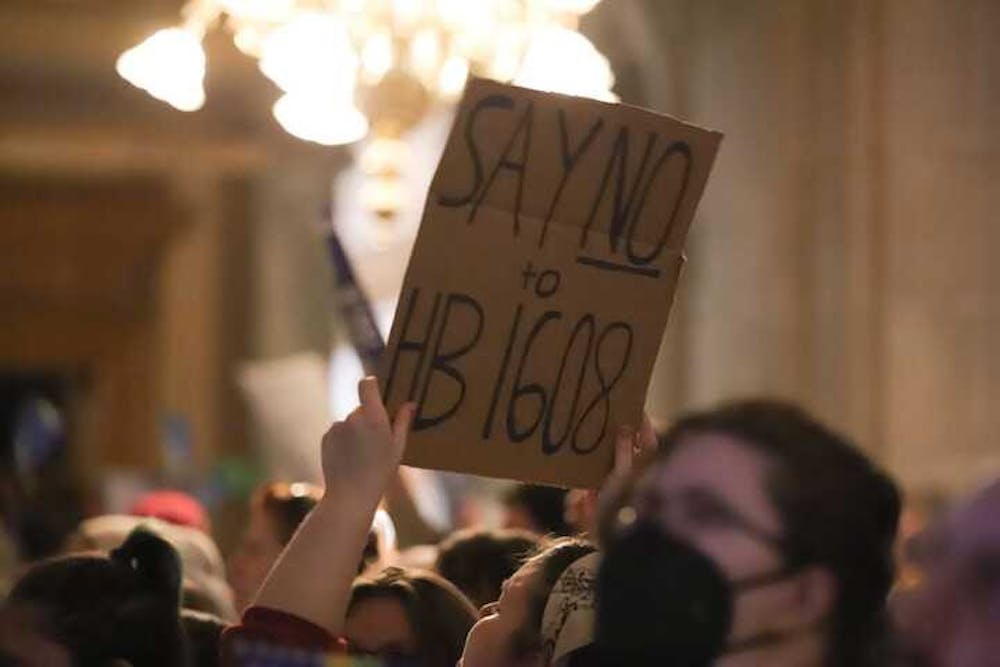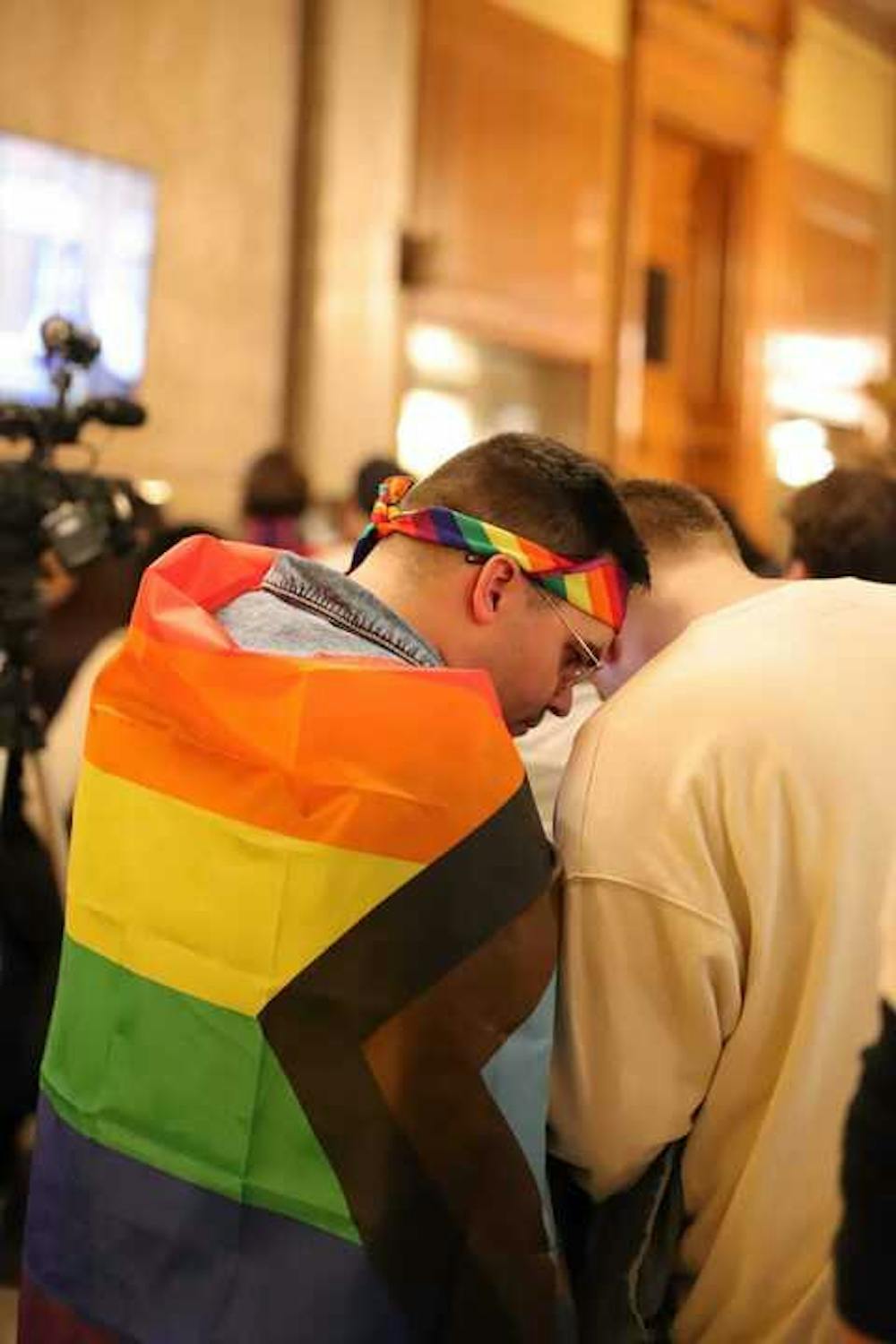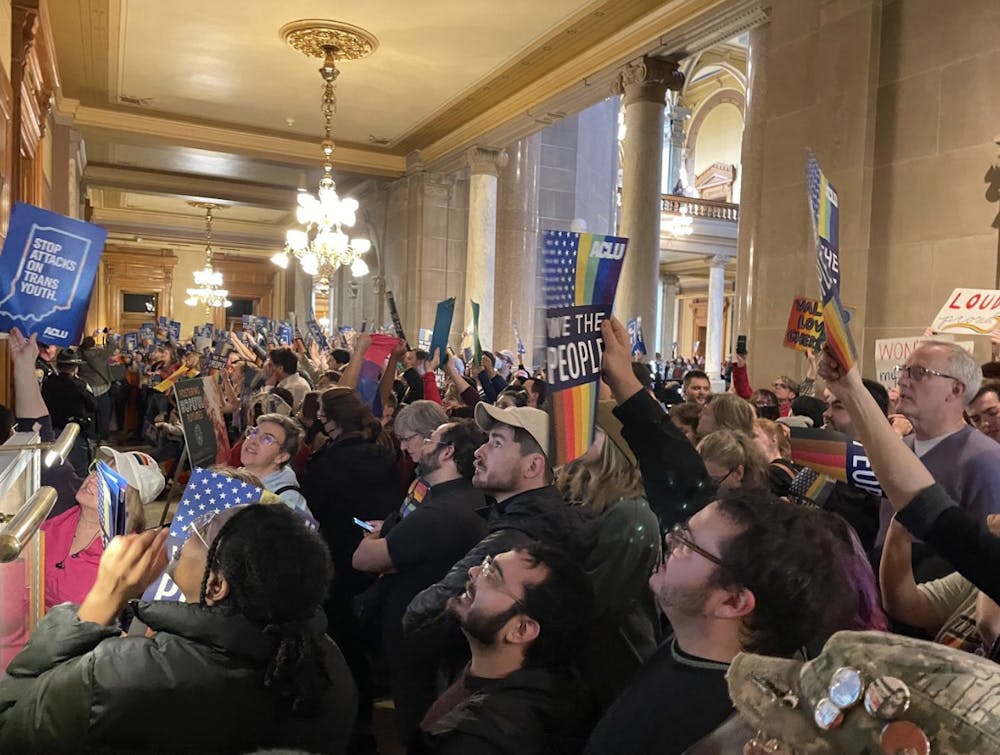Editor's Note: This story has been updated.
Jaimee Burris and Jenny Jones sat on the outside steps of the Indiana Statehouse around 8 a.m. with their two young children. Jones said it was important for their 4-year-old daughter, Eliza, to see people at the Statehouse supporting her family of two moms.
Little did Eliza know that a bill in committee that day that, despite being a human sexuality bill, has been discussed as an anti-LGBTQ+ bill which could directly affect her life.
HB 1608 states schools, employees, staff and third-party vendors used by schools in Indiana are not permitted to provide instruction on human sexuality. The bill was amended in committee to say human sexuality rather than gender fluidity, gender roles, gender stereotypes, gender identity, gender expression and sexual orientation from the original draft.
The bill also states parents must be notified by the school if a student wants to go by a different name, pronoun or title than given at birth, language added during a committee hearing. For a student to go by something different, the parent must give written consent at the start of the school year.
The bill was introduced and referred to the Education Committee, where legislators started hearing the bill Feb. 20. HB 1608 advanced 9-4, allowing it to go to second hearing on the House floor to vote on amendments, and passed through the House Feb. 23. The bill has been compared to Florida’s “Don’t Say Gay” bill signed by Governor Ron DeSantis in spring 2022.
However, HB 1608’s progression to the House hasn’t been without a fight from some Indiana citizens.
The same day of the committee hearing, protesters backed by the American Civil Liberties Union (ACLU) in Indianapolis turned out for a“Pack the Statehouse to Protect LGBTQ Rights'' event. Approximately 200 people’s cheers and boos echoed through the Statehouse, and opponents of the bill far outweighed supporters within the chamber walls.
Some of the chants included, “No hate in our state,” “We say gay” and referred to HB 1608 as a “bill of hate.”

Protester holds up sign in front of House Chamber at the Indiana State House on Feb. 20. Olivia Ground, DN
Zoe O’ Haillin-Berne, director of engagement for Indiana Youth Group, said this bill will make some students feel like their identity is “a dirty word, taboo, forbidden.”
“Think about role models that you had as a student,” she said. “If you’re not seeing yourself in the world, if you’re not seeing yourself in the greater narrative of society, it makes you question where you belong.”
Haillin-Berne said this bill particularly marginalizes LGBTQ+ students because all students have pronouns, gender and a sex. In order to eliminate all sexuality in a classroom, she said schools would have to stop using Mr. and Mrs., and fairy tales with princes, princesses and romance would have to change. She believes sexuality and gender seem to only become inappropriate when it breaks away from straight and cisgender dynamics. Cisgender refers to someone who identifies with the gender that corresponds with their sex at birth, according to Oxford Dictionary.
Keith Gambill, president of the Indiana State Teachers Association, said a child may feel shame from being redirected in conversations due to teachers not wanting to get in trouble with the law. Rachel Burke, president of Indiana Parent Teacher Association, referred to this as the “chilling effect,” where teachers overcompensate their behavior to stay clear of being punished even if the law doesn’t completely limit their behavior.
One example Gambill discussed was storytime in a classroom when students talk about their lives. If a student has parents of the same sex, this can provide a challenge with teachers having to make decisions on how to approach the situation while still abiding by the law.
Gambill believes legislators don’t know what’s actually going on in the classroom, and in reference to HB 1608 and pronouns, he said there are not numerous students asking teachers to call them by a different pronoun.
When Haille-Berne was a teacher, she said she approached topics on sexual orientation and gender in everyday discussion by having stories with diverse characters and using accessible language in the classroom. It wasn’t making special lessons or direct conversations about it, she said.
One big misconception Burke said people have about school is that teachers try to “indoctrinate” children.
“Teachers want children to learn to feel safe, teachers want to be able to teach in a safe environment and make [sure] … their students have the absolute best possible chance to learn,” she said. “There’s no big agenda to indoctrinate people or to have them turn out one way or another politically … They’re not in the teaching profession to indoctrinate kids.”

Protester wears a pride flag in front of House Chamber at the Indiana State House on Feb. 20. Olivia Ground, DN.
Burke clarified she believes parents should be able to take their children out of certain lessons in the classroom and be in control of what their child is exposed to. However, she doesn’t believe legislators should control what all children and all teachers do.
Gambill said he believes isolated cases of educators teaching things that are inappropriate should be dealt with on a case-by-case basis.
“I am simply puzzled and extremely troubled by this practice of making a wild allegation and then just placing that on the entirety of our school system,” he said.
Gambill said transparency is present in the classroom. He said standards are created at the state level, with input from instructors across the state. Then, the school's curriculum is created from those state standards.
However, not every Hoosier is against legislation barring human sexuality discussions and materials in the classroom. Some people welcome its adoption.
Rhonda Miller, president of Purple for Parents of Indiana, and a supporter of HB 1608 and other, similar proposed legislation, said inappropriate discussions on sexuality are occurring in the classroom.
“We know lawmakers, as well as our Attorney General, have been receiving massive amounts of complaints from parents from all corners of our state about the inappropriate material that teachers are indeed using in classrooms. We've had parents reach out to us telling us their children have even been forced to read inappropriate material … in class,” Miller said.
The Daily News reached out to the Attorney General to verify, and the press secretary said they have received some complaints but didn’t have an exact number.
When it comes to LGBTQ+ students being represented in stories and the classroom, she said one segment of children shouldn’t be prioritized over others, and it creates division.
“Schools should be no place for these ideologies,” she said via email. “[Teachers] need to stick to teaching reading, writing, math, science and leave sexual and social issues to parents.
“Our children can't even read at grade level and instead our schools are focusing on matters of sexual nature which should be left to parents. It's not the school's job to discuss these personal matters with children,” Miller said.

Protesters gather outside the Indiana State House on Feb. 20. Olivia Ground, DN
She also said those who claim this bill will hurt LGBTQ+ students are using a tactic to create an emotional reaction, rather than placing the blame on teachers and schools whom she believes are the ones actually harming students.
Miller said she is a bigger proponent of SB 413, another bill sent to committee this legislative session. SB 413 prevents schools and outside vendors working with schools to discuss gender and sexual orientation in grades K-12. It also states schools must notify parents if a student at the school uses a bathroom opposite of their biological sex.
“Schools are no place for sexual discussions. They [schools] can't even effectively teach the basics. Just look at our test scores. Taxpayers deserve better from the millions of dollars spent on education and schools need to leave sexual and social issues to parents,” Miller said.
Rep. Michelle Davis, R-Whiteland, author of HB 1608, was unable to give a full interview by the time of publication but did provide some explanation for why she feels this legislation is necessary.
“House Bill 1608 would empower Hoosier parents by promoting transparency between parents and schools and reinforcing that they’re in the driver’s seat when it comes to introducing sensitive topics to their children,” she said via text through her press secretary. “The bill would simply prohibit instruction on human sexuality in kindergarten through third grade. It would also ensure parents are involved in decisions to refer to their children by names that are inconsistent with their biological sex. This is common sense legislation to support parents’ fundamental rights.”
Rep. Sue Errington, D-Muncie, said she thinks it’s a “terrible bill” that got worse during committee.
She said unless there is an outcry from the public, the bill will likely pass. She also said people are “smart to be worried” about this bill becoming a slippery slope for other legislation.
“There’s some kind of national effort going on to raise this as an issue too,” Errington said. “I mean, it’s very punitive, and transgender kids especially are vulnerable to this type of bullying because that’s what it is. It is state-sponsored bullying.”
When kids ask questions, Errington said, people can be sensitive, but people should give them honest answers.
“There are kids in the classroom that are not just like some of the other kids,” she said, “And if you’re a teacher, you are there for all your students, not just those that fit a mold that this legislation is designed to promote.”
The Daily News contacted the American Family Association for Indiana for this article but no response was received prior to publication.
For more information on specific bills and the legislative session, visit the Indiana General Assembly website.
Contact Elissa Maudlin with comments at editor@bsudailynews.com or on Twitter @ejmaudlin.





